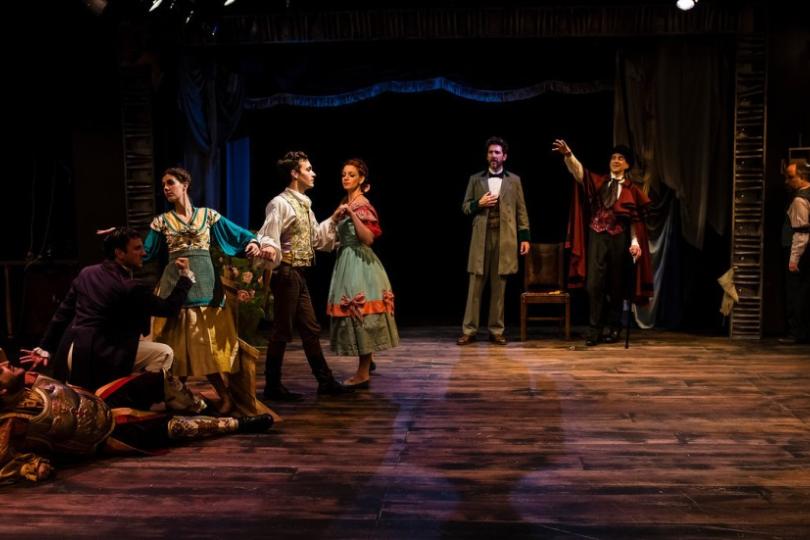Best of 2014-15: Healing and forgiveness

Basking here in the sun, tasked with reflecting on the 2014-2015 season, eclectic memories float into my head. A vibrant sunset as the music soars (Huck Finn at Children’s Theater). A well-choreographed display of tenderness as your heart breaks (Soma Acrobatic Theatre’s Terra Incognita at the Fringe). A thud of realization as a racial slur lands (Mu Performing Arts’ Fresh off the Boat at the Mixed Blood). A boyish yank of a jacket coupled with a grin (Girl Friday Productions’ The Matchmaker at Park Square Theater).
Sketching images, I recall the silly and haunting and confusing and terrible. Yet the theme I loved the most from this past season was healing and forgiveness.
From healing after a tragedy to healing from a relationship, these performances made me laugh and cry and argue and plead. But more importantly, these pieces allowed me to consider large questions outside their intended spheres. How do we humanize policy, matching unwieldy gun control laws to individual stories? Under what desperate and humble circumstances do we seek (or refuse) healing? When do we begin to ask for forgiveness--or offer it to those around us?
Big questions, I know. But isn’t that the entire point of theater? To prove things matter, to incite reactions, to challenge misconceptions--to make you feel and to make you think. And I guess on this September day I’m thinking about healing and forgiveness.
Praying for healing and justice
Pillsbury House Theatre’s The Gospel of Lovingkindness was possibly my favorite production this season: I loved Marcus Gardley’s thoughtful writing, stunning performances by folks like Thomasina Petrus and James A. Williams, and the timeliness of this work. This heartbreaking piece explores the lives of two young black men on the South Side of Chicago. As the theater explains: “The Gospel of Lovingkindness is at once an urgent appeal for an end to gun violence and a prayer for forgiveness, dignity, and hope.”
The Gospel of Lovingkindness draws you into a beautifully complicated world. A young Black man sings at the White House and gets a new pair of shoes. A tired mother smiles with pride at his promise. Another young Black man struggles to find work, balancing his new child with his mother’s expectations. A Black father performs his joy over the perfect pie and then his utter grief over losing a son.
Aside from weeping fairly consistently through the show, I was moved by Gardley’s unflinching look into the everyday impacts of institutionalized racism upon real characters. The triumphs were so pure, the heartbreaks so eviscerating--and when Thomasina Petrus performed her final solo as the stricken mother who just lost her son, I felt my breath catch.
Amidst such injustice and senseless violence, where do we find healing? How many more shows need playwrights craft, how many more petitions need activists pen, how many more chants need protesters spew before we move through rage to healing? Can healing help in the search for justice?
Chasing forgiveness
Theatre Pro Rata’s The Illusion at Park Square grappled with healing and forgiveness between a cold unforgiving father and his young and foolish son. Running out of options, the father turns to an illusionist to track down his missing boy. A series of play-within-a-play scenes tease the father, challenging his quest for healing in his estranged relationship. Upon finally finding out his son is an actor and that the illusions were merely theatrical performances, the father turns his back and leaves.
While essential for the humor of the piece, the father’s decision to bolster his hardened heart into turning away from his son has remained with me. Ever the picture of fatherly concern beforehand, at some point pride and disdain and insecurity clouded his path and misled him. In the end, the father (played Paul De Cordova) chased merely the idea of healing and forgiveness in finding his son: in actuality, he was far too afraid and unfeeling to pursue either.
Months later, this final image still haunts me. Estrangement is hard, if sometimes necessary. The Illusion made me think about the complication of finding healing within family. How heavily does familial obligation weigh? When do gratitude and pride inhibit forgiveness? Why do we pretend to be fine without one another in our lives?
Withholding forgiveness
Offbeat Productions took a decidedly different tone: their spirited reading of a 20-page notebook found outside a house in Duluth explored the intense feelings following a messy breakup. Appropriately titled, Everything You’ve Done to Hurt Me, the performers certainly found humor in the author’s ramblings--typos and non sequiturs and all. From pent-up work-related rage to jealousy of former flames, from manipulative games to interactions with friends, ending in a damning description of incest, this anonymous author of this notebook worked through all their feelings about his relationship.
Yet in between bursts of laughter, this piece made me think about relationships falling apart and how much we pretend they work, then struggle to piece them back together. As wacky as this piece certainly was, Everything You’ve Done to Hurt Me made me consider: At what point do you lay a relationship to rest? In the nexus of so much pain and betrayal and anger, where do you find healing? At what point can you offer forgiveness?
Let me be clear: this piece offered no cathartic relief. It was shit-talking stream-of-consciousness, just as the author intended and probably needed. But reading in between the lines and processing on the lightrail trip home, I wonder under what circumstances this author might infuse some grace into their bitter memories of this relationship.
Thinking ahead
These pieces were just slivers of 2014-2015 Twin Cities theater, and there were so many other parts of each I could have tackled. But for whatever reason, as I recall my final year of college and now move into alumni territory, I am struck by the need for healing and forgiveness.
What power do we let wounds claim over us? When do we reach past the rage and pride to something better? And how can we make damn sure that 2015-2016 holds both healing and forgiveness in store?




